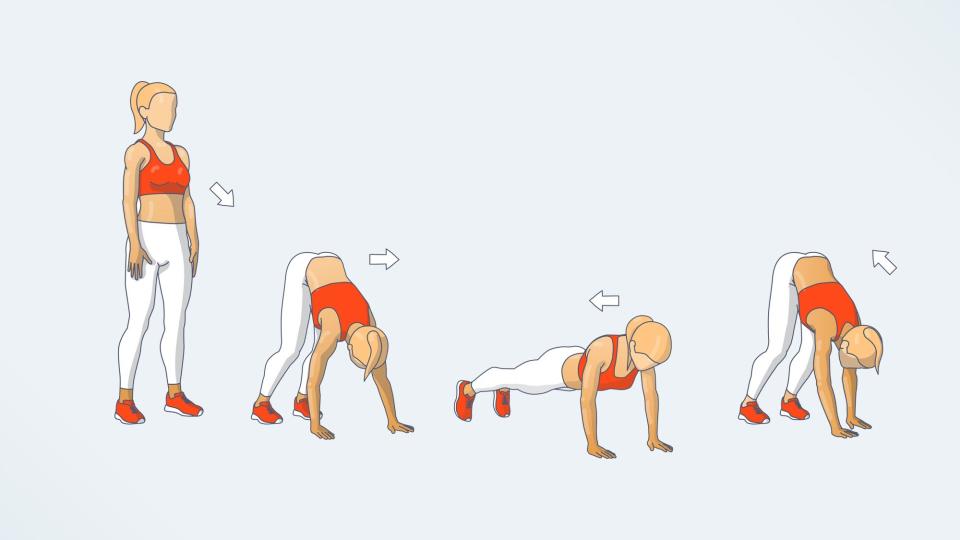I did the inchworm exercise for a week — here’s what happened

After my less-than-satisfying week of doing the swimmer exercise, I was in the market for a challenge that involved more actual movement and didn’t make me worry about the future of my lower back. And so, as if reading my mind, my editor said: How about the inchworm?
‘Yes!’ I yipped, trying not to think of the oddly haunting Danny Kaye song from the old movie Hans Christian Andersen. The tune, of course, has not left my head since then, but the exercise has found a special place in my heart.
What is the inchworm?
This is an exercise that has it all. It’s a body-weight move that builds strength, improves flexibility, and range of motion, and gets the blood pumping to boot. It’s a great warm-up exercise but also fits beautifully into a workout routine. It targets just about every major muscle group and it’s an exercise you can do almost anywhere. From a standing position, you bend, walk your hands out until you are in a push-up or plank position, then walk your hands back. Easy? Nope. Worthwhile? Definitely.
How to do the inchworm exercise
Stand tall with your feet about shoulder-width apart. From here breathe in, engage your core and, as you breathe out, bend at the waist and reach down to touch the floor in front of your feet. Keep your legs as straight as possible as you lower; however, don’t worry or feel disappointed if you have to bend your knees to touch the floor. Flexibility varies greatly and, in any event, this move will improve yours.
Now walk your hands forward until you are in that push-up or high plank position. Your hands should be under your shoulders and your body should be straight from raised heels to head, with no sagging in the midsection.
Slowly walk your hands back to your feet, keeping your legs straight, and from here you can either stand up or remain in the bent position. If you choose to stand up, do so in a controlled fashion. Don’t snap to attention. That’s one rep. Aim for three sets of five to 10.

A popular variation on this move is to continue moving forward as far as you can. So, rather than walk your hands back to your feet, you walk your feet to your hands from the plank position, then walk your hands forward again, and so on. Of course, this requires a lot of space. I don’t have a runway in my house, so I focused on the version that requires no more space than the length of my body.
Here’s what happened when I did the inchworm for a week
Day one
My first thought, on the first day, was, “This is more like it.” Cardio, strength and a stretch all in one slightly inelegant move. After three sets of eight I could feel the effects all over my body — in my shoulders, upper arms, across my back, in my defiantly stubborn hamstrings, and in my core (though less here than I expected). I had to bend my knees more than seemed decent, but I knew my flexibility would improve as the days passed. By the end of the final set, I was breathless. But happy.
Day two
On day two, I did the move early in the morning, which was not ideal, as my muscles were having their first coffee and my hamstrings were still asleep. This is a great warm-up move but make sure you are at least awake before you try the inchworm. It asks a lot. My movement was more controlled this time — resist the temptation to rush this exercise — but I was still out of breath by the end, and had to break for 30 seconds between sets.
Day three
By the third day, I was feeling slightly daunted by the move; not to the extent that I didn’t want to do it, but in the sense that I knew I was about to be challenged. That, I think, is a good way to feel about an exercise. I noticed I was able to keep my legs straighter throughout the sets and felt the effects for hours afterwards in my shoulders and upper back. But what surprised me was the fact I was still not feeling it so much in my core.
Day four
Day four: the move was not getting any easier from a pure cardio perspective — and I didn’t expect it to — but my form was better, which lessened the effort somewhat. I was stuck on three sets of 10 and felt I was going to have to increase the reps in the interests of the challenge. And my self-respect.
Day five
On day five, I moved some things in my hallway and tried the moving version of the exercise. I felt this more in my hamstrings than anywhere else, but because I was moving forward, I actually found the move less mentally challenging. (There is an unavoidable monotony in going back and forth over the same small stretch of floor, like doing laps in a small room where the only art on the walls is a painting of dogs playing cards.) I added two reps to each set and, for the first time, I noticed the move throughout my core, but still felt my other muscles were being worked much harder.
Day six
The following day I reverted to the basic move but added a push-up to each rep. You won’t be surprised to know this made things much harder after a while. I was slower to walk my hands back and noticed I was bending my knees as I rose to a standing position. Gratifyingly, I found my core coming more into play and, of course, I was also working those chest muscles.
Day seven
I can’t recall an exercise in this series of challenges that I could feel in my muscles all day, and the following day, especially in my back and shoulders, and in the increased flexibility of my hamstrings. On the final day, I manage three sets of 12, which I deemed a great success. The inchworm is a one-move marvel and despite the name, it will take you a long way on your fitness journey. Try it. Now, everyone: ‘Inchworm, inchworm/measuring the marigolds…’ You didn’t think I was going to suffer alone, did you?
